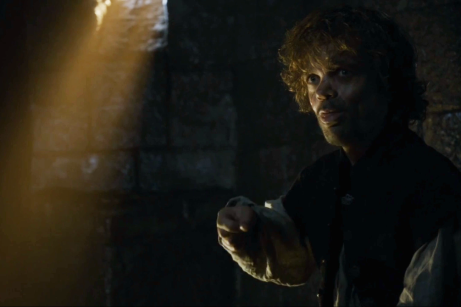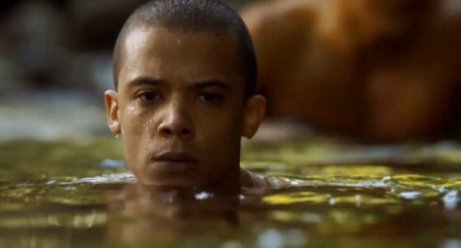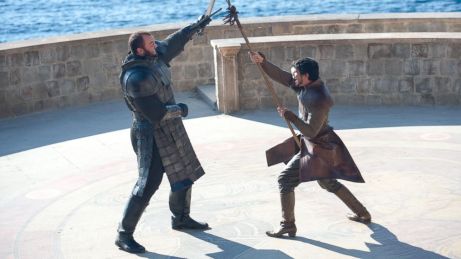Warning: This blog post contains massive SPOILERS of the television series Game of Thrones. Please do not read any further if you have not watched Season 4, Episode 8 of Game of Thrones.
There has been a lot of talk about the famous beetle scene, the penultimate scene in this past Sunday night’s Game of Thrones episode, entitled “The Mountain and the Viper.” In the scene, Tyrion reminisces about his cousin Orson, a simpleton who derived a lot of pleasure from smashing beetles upon the pavement. While the scene started out as entertaining, somewhat juvenile banter between Tyrion and Jamie Lannister, the scene took a sudden turn for the existential. In the scene, Tyrion muses on the meaning of seemingly senseless violence.
There has been a lot of speculation on the meaning of this scene. The folks at IGN seem to think Cousin Orson represents George R. R. Martin himself or is at the very least, a nod to the audience. I think it’s clear that this scene does seem to be a philosophical commentary on the moral ambiguity of the show and books in general, in which good does not necessarily triumph over evil, and the hero doesn’t always come out on top, as we as an audience have experienced repeatedly, often in a brutal fashion. Martin himself has often said he enjoys subverting traditional hero story lines.
This is most obviously displayed in the final scene of Season 4, Episode 8 in which Oberyn Martell and Gregor Clegane (better known as “the Mountain”) face off in single combat. A compelling, dangerous, charming prince with a sexy Dornish accent appears on the scene and by all traditional accounts, should prevail in the battle; however this hope is dashed to pieces as the Mountain horrifically smashes Oberyn’s head like a grape. I watched the Red Wedding multiple times, but I could not bear to watch this scene in it’s entirety–it’s too gruesome.
I find it interesting that the beetle scene is bookended with the opening scenes of Grey Worm and Missandei conversing about the suffering they have both endured. Grey Worm sees nothing but purpose and meaning in the suffering of his life–He wholeheartedly sees his castration, enslavement and personal suffering as a pathway to the life he has now, an honorable life of willing and loyal service to Daenerys. Contrast that with Tyrion, who–through a philosophical conversation about beetles–struggles to make sense of a senseless situation he finds himself in–being tried for murder he did not commit and subjected to the mercurial laws of gods and men. Granted, Tyrion himself had a hand in his own fate, as he defied his father and Jamie’s plan to merely have him confess and sent to the Wall.
These two philosophies–suffering is meaningful vs. suffering is senseless–come to a head in the trial by combat. It’s almost as if the combat is the resolution of these two opposing philosophies. Yes, Oberyn DID achieve his purpose in being in King’s Landing–he did get the upperhand in that fight and managed to extract a confession and exact his own form justice (assuming the Mountain is dead, of course) ; however, in the moment he did that, it also cost him his life, as his eyes were gouged out and his face was literally smashed by the Mountain’s ferocious grasp. Oberyn’s suffering DID have meaning but was also simultaneously and senselessly snuffed out.
It’s almost like a bad joke: A dwarf, a worm and a viper walk into a bar…
But that’s essentially what this episode was: a commentary on the question of suffering, how characters handle it and how we as the audience are meant to cope with the dramatic, seemingly senseless violence in this ever-evolving landscape that is Westeros. We can laugh maniacally at it like Arya; we can assert control and manipulation (“chaos is a ladder”) like Littlefinger or most recently, Sansa; we can be consumed with vengeance like Oberyn; we can find purpose and meaning like Grey Worm; we can simply throw our hands up at the meaninglessness of it all like Tyrion.
But whatever we decide, as in George R. R. Martin’s world, we can only know that we know nothing, Jon Snow.




A very insightful post and I loved your brief comments on Grey Worm and the nod towards Ygritte at the end- genius writing! Really, very well done and I must re-read the Mountain and the Viper scene again in Blood and Gold- you’ve picked up on some really interesting points that I’ve either obviously forgotten or skimmed over so thank you!
Phoenixflames12 x
Thank you! I am only a recent reader of the books myself (just finished the series last week!). I think the fun of the show is that as we go further along the storyline, plot inventions that are strictly in the show (a.k.a. the beetle scene and the Grey Worm/Missandei romance) become a brilliant way for Benioff and Weiss to explore these themes in a new or unexpected way.
Reblogged this on Confessions of a fanfiction writer whose dreams are to reach the sky and commented:
A very insightful post and I loved your brief comments on Grey Worm and the nod towards Ygritte at the end- genius writing! Really, very well done and I must re-read the Mountain and the Viper scene again in Blood and Gold- you’ve picked up on some really interesting points that I’ve either obviously forgotten or skimmed over so thank you!
Phoenixflames12 x